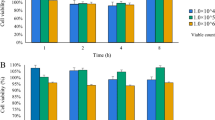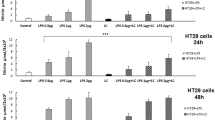Abstract
Selective microbes used as probiotics can enhance epithelial cell protection. We have previously shown that a Lactobacillus plantarum strain 299v (Lp299v) has the ability to induce mucin genes. In the current study, we utilized a cytokine model of inflammation in cell culture to study the modulation of apoptosis by this probiotic. HT-29 cells were pre-incubated with the Lp299v or L. plantarum strain adh- (Lpadh-), a non-adherent derivative of Lp299v. Cells were challenged with a mixture of cytokines (TNF-α, IFN-γ, and IL-1a) to imitate conditions of inflammation. To assess for cell death, we evaluated TUNEL, multi-caspase, and caspase-3 and caspase-7 activity assays. There was a marked decrease in apoptosis as measured by TUNEL+ cells in samples pre-treated with Lp299v (18.7 ± 4.1%, p < 0.01) and Lpadh- (16.6 ± 3.2%, p < 0.05) prior to cytokine exposure when compared to cells (43.6 ± 6.2%) exposed to the cytokine mixture. Lp299v pre-incubation with HT-29 cells reduced caspase+ cells in the multi-caspase activity assay (3.6 ± 0.6%, p < 0.05) compared to cells exposed to cytokines (68.9 ± 5.1%) whereas Lpadh- did not (46.8 ± 17.5%, p > 0.05). Similarly, caspase-3, caspase-7 activity was also reduced by Lp299v. Selected probiotics may confer an exogenous protective effect at the mucosal–luminal interface for intestinal epithelial cells via alteration of caspase-dependent apoptotic pathways.



Similar content being viewed by others
References
Mack DR, Michail S, Wei S, McDougall L, Hollingsworth MA (1999) Probiotics inhibit enteropathogenic E coli adherence in vitro by inducing intestinal mucin gene expression. Am J Physiol 276(4 Pt 1):G941–G950
Sherman PM, Johnson-Henry KC, Yeung HP, Ngo PS, Goulet J, Tompkins TA (2005) Probiotics reduce enterohemorrhagic Escherichia coli O157:H7- and enteropathogenic E. coli O127:H6-induced changes in polarized T84 epithelial cell monolayers by reducing bacterial adhesion and cytoskeletal rearrangements. Infec Immun 73(8):5183–5188
Michail S, Abernathy F (2003) Lactobacillus plantarum inhibits the intestinal epithelial migration of neutrophils induced by enteropathogenic Escherichia coli. J Pediatr Gastroenterol Nutr 36(3):385–391
Cario E, Gerken G, Podolsky DK (2007) Toll-like receptor 2 controls mucosal inflammation by regulating epithelial barrier function. Gastroenterology 132(4):1359–1374
Yan F, Polk DB (2002) Probiotic bacterium prevents cytokine-induced apoptosis in intestinal epithelial cells. J Biol Chem 277(52):50959–50965
Husain KD, Coopersmith CM (2003) Role of intestinal epithelial apoptosis in survival. Curr Opin Crit Care 9(2):159–163
Deshpande G, Rao S, Patole S, Bulsara M (2010) Updated meta-analysis of probiotics for preventing necrotizing enterocolitis in preterm infants. Pediatrics 125(5):921–930
Hotchkiss RS, Coopersmith CM, Karl IE (2005) Prevention of lymphocyte apoptosis-a potential treatment of sepsis? Clin Infect Dis 41(Suppl 7):S465–S469
Palejwala AA, Watson AJM (2000) Apoptosis and gastrointestinal disease. J Pediatr Gastroenterol Nutr 31(4):356–361
Lichtenberger GS, Flavell RA, Alexopoulou L (2004) Innate immunity and apoptosis in IBD. Inflamm Bowel Dis 10(Suppl 1):S58–S62
Grishin A, Ford H, Wang J, Li H, Salvador-Recatala V, Levitan ES, Zaks-Makhina E (2005) Attenuation of apoptosis in enterocytes by blockade of potassium channels. Am J Physiol Gastrointest Liver Physiol 289(5):G815–G821
Mahida YR (2004) Microbial-gut interactions in health and disease: epithelial cell responses. Best Pract Res Clin Gastroenterol 18(2):241–253
Johansson ML, Quednau M, Ahrne S, Molin G (1995) Classification of Lactobacillus plantarum by restriction endonuclease analysis of total chromosomal DNA using conventional agarose gel electrophoresis. Int J Syst Bacteriol 45(4):670–675
Mack DR, Ahrne S, Hyde L, Wei S, Hollingsworth MA (2003) Extracellular MUC3 mucin secretion follows adherence of Lactobacillus strains to intestinal epithelial cells in vitro. Gut 52(6):827–833
Mack DR, Hollingsworth MA (1994) Alteration in expression of MUC2 and MUC3 mRNA levels in HT29 colonic carcinoma cells. Biochem Biophys Res Commun 199(2):1012–1018
Mack DR, Cheng PW, Perini F, Wei S, Hollingsworth MA (1998) Altered expression of sialylated carbohydrate antigens in HT29 colonic carcinoma cells. Glycoconjugate J 15(12):1155–1163
Ferrero-Miliani L, Seidelin JB, Nielsen OH (2006) Regulation of cytokine production in inflammatory bowel disease. Ugeskr Laeger 168(19):1847–1850
Liston P, Fong WG, Korneluk RG (2003) The inhibitors of apoptosis: there is more to life than Bcl2. Oncogene 22(53):8568–8580
Dykstra NS, Hyde L, Adawi D, Kulik D, Ahrne S, Molin G, Jeppsson B, Mackenzie A, Mack DR (2011) Pulse probiotic administration induces repeated small intestinal Muc3 expression in rats. Pediatr Res 69(3):206–211
Tsujimoto Y, Shimizu S (2005) Another way to die: autophagic programmed cell death. Cell Death Differ 12(Suppl 2):1528–1534
Clark JA, Lane RH, Maclennan NK, Holubec H, Dvorakova K, Halpern MD, Williams CS, Payne CM, Dvorak B (2005) Epidermal growth factor reduces intestinal apoptosis in an experimental model of necrotizing enterocolitis. Am J Physiol Gastrointest Liver Physiol 288(4):G755–G762
Neu J, Caicedo R (2005) Probiotics: protecting the intestinal ecosystem? J Pediatr 147(2):143–146
Hunter CJ, Williams M, Petrosyan M, Guner Y, Mittal R, Mock D, Upperman JS, Ford HR, Prasadarao NV (2009) Lactobacillus bulgaricus prevents intestinal epithelial cell injury caused by Enterobacter sakazakii-induced nitric oxide both in vitro and in the newborn rat model of necrotizing enterocolitis. Infect Immun 77(3):1031–1043
Lin PW, Nasr TR, Berardinelli AJ, Berardinelli AJ, Kumar A, Neish AS (2008) The probiotic Lactobacillus GG may augment intestinal host defense by regulating apoptosis and promoting cytoprotective responses in the developing murine gut. Pediatr Res 64(5):511–516
Competing interests
Work was supported in part through research grants from Probi AB (Lund, Sweden).
Author information
Authors and Affiliations
Corresponding author
Rights and permissions
About this article
Cite this article
Dykstra, N.S., Hyde, L., MacKenzie, A. et al. Lactobacillus plantarum 299v Prevents Caspase-Dependent Apoptosis In Vitro. Probiotics & Antimicro. Prot. 3, 21–26 (2011). https://doi.org/10.1007/s12602-011-9066-7
Published:
Issue Date:
DOI: https://doi.org/10.1007/s12602-011-9066-7




